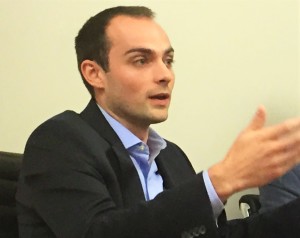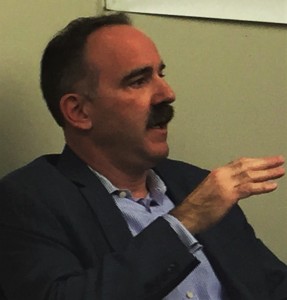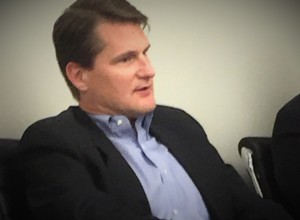Building a startup outside of Boston: Boingnet CEO Dennis Kelly Speaks about Tech life at the other end of the Redline
When you think “startup” in Massachusetts, you almost immediately think of Cambridge, Boston, or somewhere west of the city on 128. But the South Shore Chamber of Commerce, the Quincy Center for Innovation, and a few south-shore based startups are setting out to change that.
A number of local entrepreneurs and service providers gathered at the OnSource headquarters in Braintree, MA this week to participate in a panel called, “Building a startup outside of Boston – Tech life at the other end of the Redline”.
Moderated by Bobbie Carlton, Founder of Innovation Nights and Innovation Women, the panel featured the leaders of two local startups, OnSource founder and President Tim Schneider and Boingnet CEO Dennis Kelly. They joined Travis Hunter, Executive Director for the Quincy Center for Innovation and Drew Gaffney, a Business Consultant and investor based on the South Shore, to discuss the pros and cons of running a startup from the other end of the Red Line.
There’s Senior talent on the South Shore
Both Kelly and Schneider run their companies out of the South Shore for one specific reason – quality of life (i.e. avoiding nightmarish commute to Boston, Cambridge, and the 128/I-95 Corridor). And they are finding that there are many senior-level executives in the South Shore looking for the same thing. Most are even willing to take less money if it means a shift in lifestyle.
“The people looking for more senior roles, whether they be IT, Marketing, Call Center Directors, etc. These people all live in this area, said Schneider. “Oftentimes they’re like me. They commuted to a big company in the city or just outside the city for a number of years, but now they’re looking to move on from for something closer to home. We’ve actually found that our location gives us a pretty big competitive advantage when it comes to senior talent.”
There’s space on the South Shore

Travis Hunter, Executive Director for the Quincy Center for Innovation, explains his mission to drive startups to the South Shore.
Boingnet has a conveniently-located office in Rockland MA, right off of Route 3. OnSource, meanwhile, is directly across from the Braintree T station on Grossman Drive. But for newly sprouting startups, they have the option to open up shop at The Quincy Center for Innovation (QCI), a startup incubator and a subsidiary of the Quincy chamber of Commerce with an economic development mission to bring companies to Quincy. They’ve proven that startups can be successful on the South Shore, with a number of them now thriving within in their co-operative work environment.
“While the South Shore already has a lot of service providers, it was our goal to bring more innovation economy in this direction,” said Hunter. “So we established our space and lo and behold, a lot of talent exists in the South Shore. Now it’s just a competition of trying to convince that talent to stay here.”
There’s value on the South Shore
Neither Boingnet nor OnSource have encountered any situations where their location had any negative impact on their revenue growth. In fact, the savings they both realize in rent is reinvested into the business and funding future growth.
When Schneider was looking for space for OnSource to grow (something larger than the attic of his house), he first considered a spot in Cambridge.

South Shore-based investor Drew Gaffney explains how investment capital always finds its way to profitable opportunities.
“I just couldn’t reconcile it in my brain,” he said “Not only the commute, but the expense. It wouldn’t help us sell any better or impact our revenue if we were in Boston, so why do it?”
Drew Gaffney, an investor based on the south shore, reiterated the value of running a startup south of Boston.
“Investment capital always finds its way to profitable opportunities,” he said. If you’re saving on real estate, there’s more capital to invest in your business. It’s more of a question of getting the right talent.”
But are there young people there?
Because the south shore is more family oriented, both Kelly and Schneider have noticed that they don’t have come across the same level of younger talent as they do senior talent. Most young professionals prefer the action and excitement of Boston and Cambridge, particularly when it comes to hanging out with friends after work.
“We have plenty of director level and executive talent on the south shore,” said Kelly. “The challenge has been finding great young engineers who are willing to work on the South Shore. While it’s a problem that many companies face, we have to work particularly hard to attract that talent. Working in our favor, rising rents in Boston, along with the redevelopment of downtown Quincy are beginning to make stops further down the Red Line more attractive to that young talent. We see that trend accelerating in the next couple of years.”
Advice for young startups
Dennis Kelly of Boingnet, who has been involved in 6 startups over the years, closed the discussion with some great advice around investors for the entrepreneurs in the house.
“The best investor relationships occur when the founders and investors have complete alignment of interests around maximizing the value of their stock”, said Kelly. “Because you really should both be in the same boat. You both own a big chunk, and you both need complete focus on maximizing the value of that chunk. But you want to make sure that both you as founders and the investors you choose to work with are 100% committed toward your combined interests.”
Kelly mentioned that there can be pressures going on inside of investment funds or inside partnerships that have absolutely nothing to do with the long term interest of stock value creation. And sometimes founders let their egos get in the way of what’s best for themselves as shareholders. These situations can result in abrupt, difficult transitions.
“It’s really important that you get a good sense for the probability of non alignment issues arising before entering into any investor relationship. Because if you end up in a situation where there’s a partnership that’s falling apart, everyone loses. There are lots of great investors and lots of great investment opportunities out there. The key is finding them. It really doesn’t matter where you’re located, you’ve got to get out and hustle to make it happen.”




